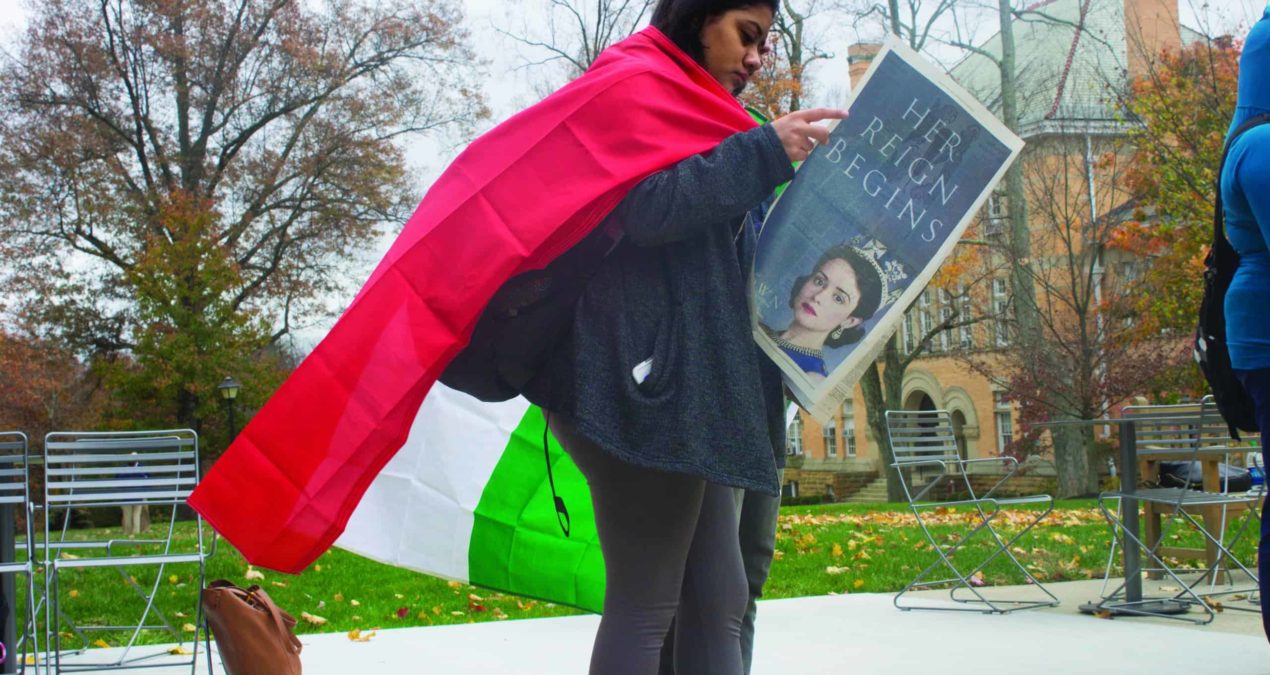HANNAH KUBBINS & RYAN STROTHER
News Editors
The flagpole by Slayter is covered in chalk-written messages. Some are encouraging, but most are divisive. “Love Trumps Hate” is crossed out with “Build it!” written underneath.The female symbol was drawn only to have the letter “X” cross it out. Messages of fear, sadness, and hate– and even joy from some–echo the feeling of campus after the presidential election.
Hillary Clinton won the popular vote 60,981,118 to Donald Trump’s 60,350,241 votes.
This is a tough loss for many of Clinton’s supporters to swallow, especially considering the fairly safe 290-228 victory that Trump enjoyed in pledged electoral votes in spite of losing popular vote.
According to an article by Political Science Professor Paul Djupe on 127 Blog, a site that investigates empirical social and institutional patterns at Denison, a survey of 600 students found that 76% of students voted for Hillary Clinton. Trump, then, earned the support of 11.5% of students, with Johnson and Stein receiving 4% and 2% respectively.
Another divide during this election is seen through the gender gap. According to Djupe’s article, the gender gap was 12% (54-42 in favor of Clinton among women and 53-41 in favor of Trump among men) at the national level.
Denison’s gap was slightly larger. 80% of women favored Clinton to the 66% of men, while 88% of those identifying with another gender supported Clinton. The national equivalent comparison is 80-9 among women favoring Clinton and 66-15 among men, also favoring Clinton.
With these numbers, it’s no surprise that the majority of the campus was disappointed with the results of the election.
Starting at 8:30 a.m. on Nov. 9, students gathered to express their frustration and anger as well as lend support to those disappointed with the results of the election.
Khadijah Muhammad ‘18, an attendee at the protest that day said, “Campus was very shaken up that day on Wednesday. From teachers and students getting emotional, to very visual Trump supporters snickering in domination…I witnessed a lot of tears and frustrations that were totally understandable,”
Another student in attendance was Luceli Hernandez ‘18. She arrived after class at 12:30pm but there had been a crowd gathered for many hours before.
“People were sharing their experiences and fears about how Trump’s election to office affects them. A few Trump supporters were there too. One of them regretted voting for Trump after hearing others’ experiences and wanted to know how he could be an ally” she said.
Since the day after the election, students and administration have been trying to set up safe spaces for students to discuss their feelings toward the new president-elect.
On the evening of November 9, a healing circle was hosted on the 3rd floor of Slayter. Students there were able to discuss their personal feelings but also what they need from Denison to heal, move on, and look to the future.
There have been many conversations on campus since the election, including the chalk statements by the flagpole that have turned into discussions. Students have written sentiments on the concrete, including “#notmypresident,” “I feel threatened,” “we are not criminals,” “don’t stay passive,” among many others. Most of these have been observed and left alone, but others have modified by Trump supporters.
One such message in chalk read “this country is not his,” on Thursday morning. By Friday, someone had crossed out a word to make the message read, “this country is his.” The message was most recently modified to read “this country is ours.”
This visible divisiveness has made students want to take more action on campus. “ I think the protest and discussions did good for people who needed to grieve and hear other views, but I think we still need to collect as a campus and really discuss what’s going to come next,” Hernandez said.
Muhammad echoed Hernandez when she said “Promoting leadership on campus is something that would be more effective. My mind is still racing but I realize our generation has not been through the worst like our parents and grandparents. We will look forward and start a revolution by using our power in education.”
Photo Courtesy of Tegan Glenn

